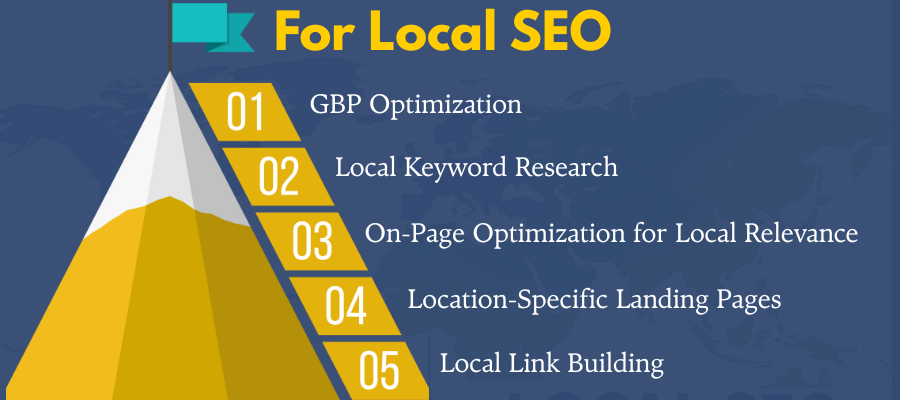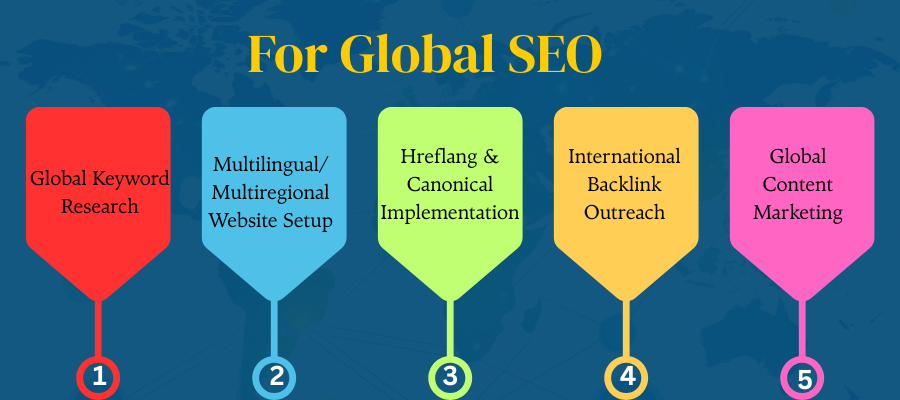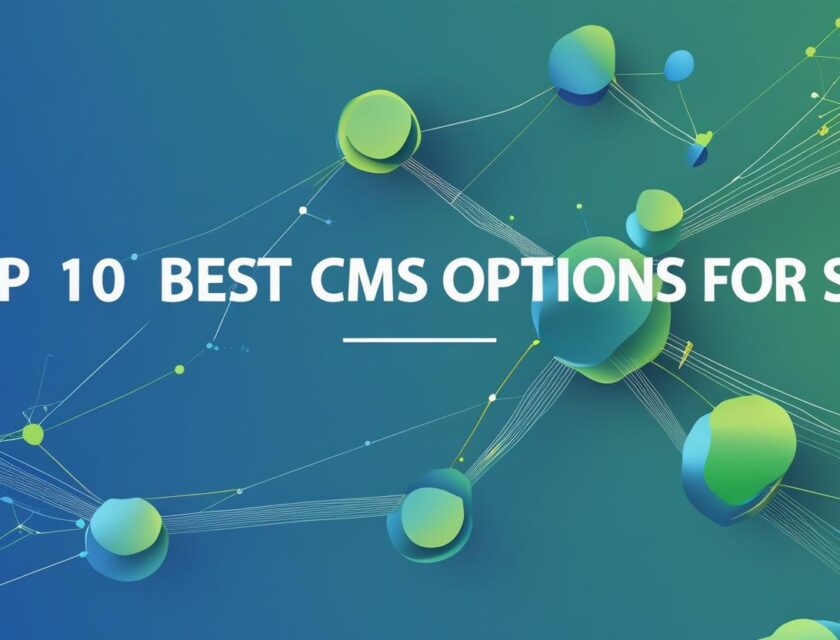Local SEO vs. Global SEO: Which One Does Your Business Need?
Summary: Understanding the difference between Local and Global SEO is essential for aligning your strategy with your business goals and audience. While Local SEO targets nearby customers through map listings and localized content, Global SEO focuses on reaching international audiences with multilingual and region-specific strategies. Each approach requires distinct tactics, tools, and performance metrics. Businesses must assess their market reach, resources, and long-term plans to decide which strategy suits them best or whether a combination of both can drive the most impactful results.
Key Takeaways:
- Discover how Local and Global SEO strategies serve different business goals.
- Learn which SEO approach aligns with your customer location and reach.
- Uncover the core differences in tactics, tools, and technical setup.
- Understand why using the wrong SEO model can harm visibility.
- Identify signs that indicate whether your business requires a local, global, or both approach.
Ranking on Google is no longer just about using the right keywords it’s about reaching the right audience in the right location. Yet, many businesses struggle to decide whether to focus on Local SEO to capture nearby customers or invest in Global SEO to expand their reach across borders.
Misunderstanding the difference can lead to poor visibility, irrelevant traffic, and missed opportunities. Whether you’re a growing brand or an established business, knowing which SEO path aligns with your goals is crucial. Let’s examine the key differences between Local and Global SEO, enabling you to make an informed, strategic decision for your digital growth.
Table of Contents
Toggle- What is Local SEO?
- What is Global SEO?
- Core Differences Between Local SEO & Global SEO
- SEO Strategy Development: How They Differ
- Key Metrics to Measure Success
- Common Mistakes Businesses Make
- Signs Your Business Needs Local SEO
- Signs Your Business Needs Global SEO
- Can You Do Both Local & Global SEO Together?
- How to Decide What Your Business Really Needs?
- Why Choose Agha DigiTech for Local or Global SEO?
- Final Thoughts
- Frequently Asked Questions (FAQ's)
What is Local SEO?

Local SEO is the practice of optimizing your online presence to attract more business from relevant local searches. These searches occur on Google and other search engines when users are looking for products or services near their location. Whether you’re a retail shop, service provider, or local franchise, Local SEO ensures your business appears in local listings, maps, and search results right when potential customers are looking for you.
Industries Best Suited for Local SEO
Local SEO is especially powerful for businesses that rely on foot traffic, localized services, or community-based outreach. These industries thrive when they appear in nearby searches and local listings:
- Restaurants, Cafes, and Bakeries
- Salons, Spas, and Wellness Centers
- Medical Clinics and Dental Practices
- Law Firms and Legal Consultants
- Home Repair and Maintenance Services
- Real Estate Agencies
- Local Retail Stores and Boutiques
- Gyms, Fitness Studios, and Yoga Centers
- Educational Institutions and Coaching Centers
- Pet Grooming and Veterinary Clinics
What is Global SEO?

Global SEO is the process of optimizing your website to reach audiences in multiple countries or languages. It focuses on improving visibility in international search engines by targeting broad, multilingual, and location-diverse keyword strategies. This approach is ideal for businesses aiming to scale globally, expand market share across borders, and connect with users from different cultural and linguistic backgrounds through region-specific search engine optimization techniques.
Industries Best Suited for Global SEO
Global SEO is essential for businesses that cater to international audiences or operate across multiple countries. These industries often rely on multilingual content, international shipping, and cross-border visibility:
- SaaS and Technology Companies
- eCommerce and Online Marketplaces
- Tourism and Travel Agencies
- Export-Import Businesses
- Educational Platforms and EdTech
- Media, Publishing, and Streaming Services
- Global Consulting and Advisory Firms
- Financial and FinTech Services
- Online Gaming and Entertainment Platforms
- Healthcare Product Manufacturers and Pharma Brands
Core Differences Between Local SEO & Global SEO
Local and Global SEO differ not just in scale, but in how search engines interpret and serve content to audiences. From keyword strategy to website structure, every element of SEO shifts based on your geographical focus. Below is a detailed comparison table that breaks down the key differences between Local and Global SEO to help you make an informed choice.
Aspect | Local SEO | Global SEO |
Target Audience | Users searching within a specific city, region, or service area | Users across multiple countries or language regions |
Business Type Suitability | Ideal for brick-and-mortar stores, local services, or regional businesses | Suitable for SaaS companies, eCommerce, or enterprises targeting international markets |
Keyword Strategy | Geo-targeted keywords (e.g., “best lawyer in Austin”) | Broad or country-specific keywords (e.g., “project management tool in Germany”) |
Search Intent | High intent to visit or contact a local business (e.g., “near me” queries) | Broader search intent including research, product comparison, and global service evaluation |
Google Business Profile (GBP) | Crucial for visibility in Google Maps and local pack results | Not typically used; focus is on website and global content |
Content Focus | Local news, service area pages, city guides, event-based content | Multilingual blogs, global landing pages, region-specific offers |
Website Structure | Single website with localized landing pages or subfolders | Multiregional/multilingual site structure (e.g., domain.com/fr/, domain.com/uk/) |
Technical SEO | Mobile optimization, site speed, structured data, GBP schema | Hreflang implementation, canonical tags, language targeting, and international sitemap configuration |
Link Building Strategy | Local citations, regional backlinks, listings on local directories | Backlinks from global publications, international blogs, and country-specific media outlets |
Social Proof | Google reviews, local ratings, and testimonials | International reviews, third-party certifications, global brand mentions |
Language Consideration | Typically monolingual unless in a bilingual region | Multilingual content with localized messaging and translations |
Competition Level | Competes with businesses in the same city or region | Competes with global brands and country-specific competitors |
Analytics Tracking | Focus on local traffic, calls, direction requests, and local conversions | Tracks sessions by country, language performance, international rankings, and cross-border traffic |
This detailed comparison shows that while both Local and Global SEO aim to boost online visibility, they involve distinct strategies tailored to different business needs. Choosing the right approach depends on your target audience, expansion goals, and geographic focus. Partnering with the right SEO service provider can help you implement a strategy that aligns perfectly with your business objectives whether local, global, or both.
SEO Strategy Development: How They Differ
Developing an effective SEO strategy requires a tailored approach based on your business’s target market. Local SEO and Global SEO differ significantly in execution from keyword planning to technical optimization. While both aim to improve visibility, their methods vary based on geographic reach and audience behavior.
For Local SEO

Local SEO strategies are focused on attracting nearby customers through location-specific signals and platforms. These techniques help build authority within a defined geographic area.
- GBP Optimization: Optimize and regularly update your Google Business Profile to enhance visibility in local search results, Google Maps, and the local 3-pack for relevant search queries.
- Local Keyword Research: Focus on identifying geo-targeted keywords that include location-specific terms, ensuring your business ranks when local users search for nearby services or products.
- On-Page Optimization for Local Relevance: Include city or regional names in page titles, headers, meta descriptions, and content to signal strong local intent to search engines.
- Location-Specific Landing Pages: Create individual landing pages for each business location or service area to target users searching in specific cities or regions.
- Local Link Building: Earn backlinks from local directories, chambers of commerce, community blogs, and regional news sites to build localized authority and trust.
For Global SEO

Global SEO strategies focus on optimizing websites to attract international traffic, considering multiple languages, regions, and search engines.
- Global Keyword Research: Conduct in-depth keyword research for different countries and languages, accounting for search trends, user behavior, and cultural nuances across global markets.
- Multilingual/Multiregional Website Setup: Structure your website using subdirectories or subdomains to serve customized content for various countries or languages while ensuring proper navigation.
- Hreflang & Canonical Implementation: Use hreflang tags to serve the correct language and region-specific content, and canonical tags to avoid duplicate content issues across similar pages.
- International Backlink Outreach: Build high-quality backlinks from country-specific websites, international media, and global directories to increase domain authority across multiple regions.
- Global Content Marketing: Develop content tailored to each region’s language, preferences, cultural context, and seasonal events to resonate with diverse audiences worldwide.
Key Metrics to Measure Success
Tracking the right metrics is essential to understand how your SEO efforts are driving visibility, engagement, and conversions. However, Local and Global SEO require different success indicators due to their distinct scopes. Below is a detailed comparison of the key metrics for each approach, how to measure them, and their specific impact on business performance.
Metric | How to Measure | Impact on Business | SEO Type |
Organic Traffic | Google Analytics > Acquisition > Organic Traffic | Indicates the volume of users reaching your site via search engines | Local & Global |
Local Pack Visibility | Track via BrightLocal, Whitespark, or manual Google “near me” search | Measures appearance in Google Maps and local 3-pack results | Local SEO |
Google Business Profile (GBP) Views & Actions | Monitor GBP Insights for views, direction requests, calls | Shows user interaction with your local business listing | Local SEO |
Local Keyword Rankings | Use tools like Moz Local or BrightLocal to track geo-specific keyword positions | Indicates how well your business ranks for localized search queries | Local SEO |
Click-Through Rate (CTR) | Google Search Console > Performance | Measures how often users click your site in search results after seeing it | Local & Global |
Conversion Rate | Set up goals in Google Analytics (calls, forms, purchases, etc.) | Assesses the effectiveness of SEO in driving valuable business actions | Local & Global |
Global Keyword Rankings | Use tools like Ahrefs, SEMrush, or Google Data Studio dashboards | Tracks visibility for country-specific or international keywords | Global SEO |
Hreflang Tag Accuracy | Use Screaming Frog, Ahrefs, or SEMrush to audit hreflang implementation | Ensures correct language/regional content is served to global audiences | Global SEO |
International Traffic by Country | Google Analytics > Geo > Location | Helps identify where global traffic originates and optimize regional targeting | Global SEO |
Backlink Profile | Use Ahrefs or SEMrush to track international backlinks and referring domains | Improves domain authority and credibility for global ranking | Global SEO |
Domain Authority (DA/DR) | Moz (DA) or Ahrefs (DR) | Reflects overall domain strength and authority across global search engines | Global SEO |
NAP Consistency | Use tools like Yext, Moz Local to audit name, address, phone consistency | Crucial for trust and rankings in local directories and citations | Local SEO |
This segmented view helps you focus on the most relevant performance indicators based on whether your SEO strategy is local, global, or a hybrid of both while using the right tools to measure SEO success accurately and consistently across each approach.
Common Mistakes Businesses Make
Many businesses begin SEO efforts without clearly aligning their strategy with business goals or market scope. This can lead to missteps that not only reduce effectiveness but also waste valuable time and resources. Here are some key mistakes to avoid:
- Using global SEO when you need local (and vice versa): Applying global SEO tactics to a business that relies on local customers or using local strategies for a global audience leads to irrelevant traffic, low conversion rates, and inefficient marketing spend.
- Ignoring multilingual optimization for international markets: Not translating or localizing your content for different countries can alienate users, reduce credibility, and result in lower rankings in non-English or international search results where language matters most.
- Skipping GBP setup for locally-focused businesses: Overlooking the setup or optimization of your Google Business Profile (GBP) means missing out on valuable visibility in Google Maps, local 3-pack listings, and mobile “near me” searches critical for local growth.
- Not adapting content to cultural and regional nuances: Using the same messaging, visuals, or tone across different markets can feel disconnected. Adapting your content to each region’s culture, behavior, and preferences greatly improves user trust and relevance.
- Tracking wrong KPIs for your SEO model: Measuring performance using irrelevant or generic KPIs can distort the true impact of your SEO efforts. Choose metrics aligned with your specific strategy local or global to guide better decisions and outcomes.
Signs Your Business Needs Local SEO
If your customers are primarily in a specific area or your services are location-bound, Local SEO is not just helpful it’s essential. Partnering with a local SEO company can boost your visibility in search results for “near me” queries and map listings. Here are clear signs that your business would benefit from a localized SEO strategy:
Sign | What It Means | Why Local SEO Helps |
You serve a specific city or region | Your business caters to a defined geographic area, like a town or neighborhood | Helps rank for geo-targeted searches and appear in Google’s local 3-pack and Maps |
Customers search with “near me” or city names | Your target audience uses location-based queries to find services | Optimizes your presence for local keywords and mobile-based searches |
You have a physical storefront or office | Walk-in traffic and local presence are key to your business | Boosts visibility in Google Maps and local listings where foot traffic begins online |
You want to appear in Google’s local pack | You aim to be featured among the top local business results | A local SEO company can optimize your Google Business Profile for increased visibility |
You rely on phone calls, appointments, or visits | Leads and sales often come through local phone calls or store visits | Local SEO increases calls, direction requests, and conversions from nearby customers |
You want to outrank local competitors | Competing businesses are already ranking locally on Google | Strengthens your authority in your area through citations, reviews, and content targeting |
Your business is listed on local directories | You’re listed on Yelp, Justdial, or other platforms but lack consistency or optimization | Local SEO ensures accurate and consistent NAP data to build trust with both users and search engines |
Signs Your Business Needs Global SEO
If your audience spans multiple countries or you’re planning to scale internationally, it’s time to think beyond borders. Partnering with a global SEO company can help you optimize your website for international visibility, multilingual content, and region-specific search behavior. Here are the key indicators that your business is ready for a global SEO strategy:
Sign | What It Means | Why Global SEO Helps |
You serve customers in multiple countries | Your products or services are available internationally | Ensures your site is optimized for different languages, regions, and search engines |
Website traffic comes from various global regions | You’re already attracting international visitors to your site | Global SEO structures your site to serve the right content to the right audience |
You plan to expand into new international markets | You have growth goals targeting foreign countries | Helps develop country-specific SEO strategies and localized campaigns |
Your website supports multiple languages | You offer content in more than one language | Global SEO ensures proper hreflang implementation and multilingual indexing |
You face competition from global brands | Your competitors dominate in international SERPs | A global SEO company can help you improve visibility and authority in foreign markets |
You ship or deliver products across borders | Logistics and services reach beyond your domestic market | Optimizes product pages, metadata, and keywords for international search behavior |
You need culturally adapted content for each region | Messaging and offers need to reflect local language, culture, and preferences | Global SEO ensures content resonates with each market to increase engagement and trust |
Can You Do Both Local & Global SEO Together?
Many businesses today operate in multiple markets serving local customers while also expanding across borders. In such cases, adopting a dual SEO approach makes strategic sense. With the support of a professional SEO company, you can effectively combine Local and Global SEO to target both neighborhood searches and international audiences without compromising either. Here’s how both strategies can work in sync:
- Develop geo-targeted and global landing pages: Create dedicated landing pages for local areas and separate ones for global markets to target users based on language, geographic location, and search behavior across different regions.
- Use layered keyword strategies: Incorporate a mix of region-specific keywords (e.g., “dentist in Mumbai”) and global terms (e.g., “top dental clinic”) to attract both local searchers and international prospects simultaneously.
- Implement localized content within a global site structure: Add localized blogs, service pages, and updates within a multilingual website architecture to provide culturally relevant content without compromising global scalability or user experience.
- Optimize for Google Business Profile and hreflang: Maintain well-optimized Google Business Profiles for local visibility while using hreflang tags to ensure users in global regions receive the correct language and location-based content.
- Balance backlinks from local and international sources: Build a diverse backlink profile by acquiring citations from regional directories and securing links from global websites, helping you rank well locally and internationally.
- Monitor separate KPIs for local and global goals: Track localized metrics like map views and direction requests, along with global indicators such as international traffic, keyword rankings, and language-based conversion rates.
How to Decide What Your Business Really Needs?
Determining whether your business should invest in Local SEO, Global SEO, or a blend of both depends on several critical factors. It’s not just about where you operate but where your customers are, what your business goals look like, and how much you’re prepared to scale. With the guidance of a trusted SEO agency, you can make a clear, data-driven decision tailored to your growth stage and market scope.
Ask Yourself:
Before choosing an SEO path, it’s important to reflect on your business’s structure, audience, and future ambitions. These foundational questions will help narrow your direction with clarity.
Where are your customers located?
If your primary customer base is within a specific city or region, Local SEO will likely generate faster results. Global SEO is ideal if your audience spans multiple countries or regions.
What are your short-term and long-term goals?
Targeting local visibility might support short-term wins like walk-ins or local leads. But if expansion into international markets is part of your long-term roadmap, your strategy must align accordingly.
Do you have the resources for global scaling?
Going global requires investment in multilingual content, international SEO tools, and specialized technical setup. Make sure you have the budget, team, and infrastructure to support this level of execution.
Use Market Research, Google Analytics, and Keyword Planner Tools
These tools help you understand where your audience is coming from, what they’re searching for, and which regions show the most interest. Google Analytics reveals traffic by geography, while Keyword Planner shows search trends by country. Market research helps you identify language preferences, cultural differences, and purchasing behaviour, essential insights for choosing between local and global strategies. An SEO agency can interpret this data to guide your direction effectively.
Conduct a Competitor SEO Analysis (Local vs. Global)
Analyzing competitors helps you understand what’s working in your niche. Are top-ranking businesses focused on local SEO with strong Google Business Profiles, or are they dominating globally with multilingual content and international backlinks? Use tools like Ahrefs or SEMrush to compare keyword targeting, backlink strategies, and website structures. This competitive insight reveals where opportunities lie and what you need to outperform them locally or globally.
Why Choose Agha DigiTech for Local or Global SEO?
Business growth today depends heavily on how well you’re found online whether by nearby customers or international audiences. To achieve sustainable digital success, your SEO strategy must align with your geographic focus, audience behavior, and long-term goals. That’s where the right SEO partner makes all the difference ensuring your business ranks not just higher, but smarter.
Agha DigiTech brings proven expertise in both Local and Global SEO, helping businesses amplify their online presence across maps, search engines, and global markets. Our team builds data-driven strategies from optimizing Google Business Profiles for local visibility to structuring multilingual websites and international content for global scalability. With a personalized approach, transparent performance tracking, and a deep understanding of search intent, we ensure your brand stands out whether you’re targeting a single city or the world.
Final Thoughts
Choosing between Local and Global SEO comes down to understanding your audience, business goals, and market potential. While Local SEO helps build strong visibility within specific geographic areas, Global SEO opens the doors to international reach and brand expansion. Some businesses may need one, while others benefit from a blended approach that targets both markets effectively.
If you’re unsure which path suits your business best, our experts at Agha DigiTech are here to guide you. Whether you’re aiming to rank locally or expand globally, we’ll craft a tailored SEO strategy that drives real results. Contact Agha DigiTech today to get started on maximizing your online visibility and growth.
Frequently Asked Questions (FAQ's)
How long does it take to see results from Local or Global SEO?
Local SEO typically starts showing results within 3 to 6 months, depending on your industry, competition, and consistency. Global SEO can take 6 to 12 months or longer, as it involves complex elements like multilingual content, international backlinks, and region-specific technical optimization that take time to build authority.
Is Global SEO only for large businesses?
Not at all. Small and mid-sized businesses can benefit greatly from Global SEO if they serve international markets or plan to expand. With a targeted strategy, even smaller brands can improve global visibility, reach new customers, and compete effectively without needing a large corporate presence.
Can Local SEO work without a physical address?
Yes, service-area businesses can still leverage Local SEO by creating a Google Business Profile without displaying a storefront address. Instead, you can define specific service areas. Maintaining NAP (Name, Address, Phone) consistency across listings remains critical to ensure trust and visibility in local search results.
Why should I hire an SEO agency for Local or Global SEO?
Hiring an SEO agency ensures your strategy is tailored, technically sound, and aligned with your business goals. Agencies handle everything from content and keyword research to backlink building and analytics, saving you time and resources while helping your business grow locally, globally, or both.
Can I switch from Local SEO to Global SEO as my business grows?
Absolutely. Many businesses start with Local SEO to build visibility in their immediate area. As the business scales, you can gradually expand your strategy to include Global SEO by adding multilingual content, regional site structures, and international keyword targeting to reach wider global audiences.





